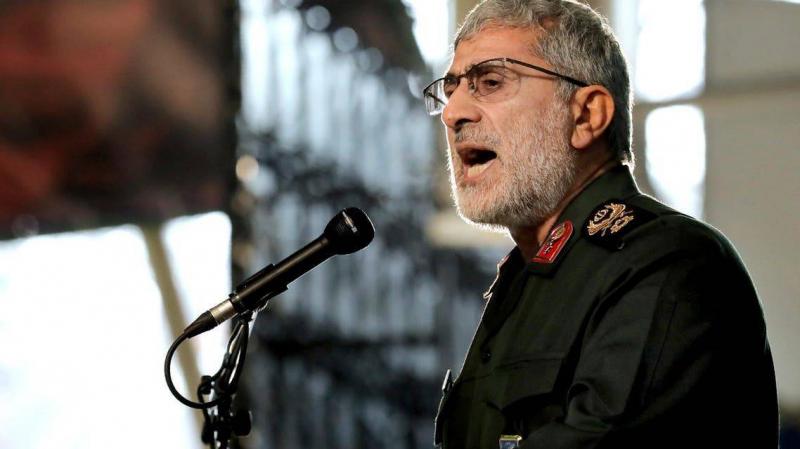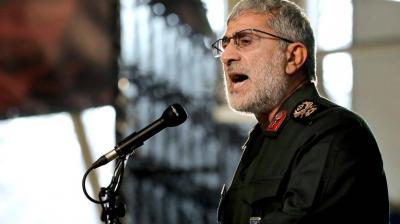Just one day, or rather hours, before the meeting between Iraqi Parliament Speaker Muhammad al-Halbousi and Kurdistan Region President Nechirvan Barzani, the leader of the Sadrist movement, Muqtada al-Sadr, on Monday, the commander of the Quds Force of the Iranian Revolutionary Guard, Ismail Qaani, made an unannounced visit to Erbil, north of Baghdad, seemingly as a last attempt to mend the rift among Iraqi political forces, particularly the Shia factions, and to find a solution to Sadr's stance seeking to form a "national majority government," as confirmed by observers to Al Arabiya. Qaani's visit followed a previous round that began with a trip to the city of Samarra.
An informed source indicated that "Qaani's visit to Erbil aimed at meeting with the Kurdish political forces, particularly the leader of the Kurdistan Democratic Party, to bring viewpoints closer concerning the formation of the new government and to try to exert pressure on the party after the agreement between Sadr and the Iranian-aligned Coordination Framework reached a dead end."
**The Last Opportunity**
In the same context, international law professor at Gihan University, Mohannad al-Janabi, stated that Qaani's visit seems like a last opportunity before finalizing the second phase of government formation (and the election of the president), especially since previous attempts to bridge the gap between Sadr and the Coordination Framework (which includes Iranian-aligned Shia parties and factions, primarily the Conquest Alliance and Nouri al-Maliki's bloc) had failed. He mentioned to Al Arabiya that the Iranian visitor met with Masoud Barzani either to convince him to abandon his alliance with Sadr in exchange for support from the Coordination Framework or to maintain this alliance in return for conceding the presidency to the Patriotic Union of Kurdistan (its candidate for presidency, Barham Salih).
**Declining Role of Qaani**
Al-Janabi added that Qaani realizes the difficulty of influencing Sadr to include all sectors of the Coordination Framework in the largest bloc (which has the authority to form the government), thus he is trying to circumvent this issue by persuading the Kurds to create the position of Vice President and Grant it to al-Maliki, whom the Sadrist movement refuses to include in the upcoming government, so as to ensure the full integration of the Coordination Framework's factions into the new government. He also noted that signs from this visit and previous ones do not only indicate failure in Qaani's mission but also confirm that the IRGC axis in Iraq suffers from a misjudgment of the political changes, as the Kurdistan Democratic Party does not require the Coordination Framework's support to pass its candidate.
Furthermore, it showcased the declining role of the Quds Force commander in influencing the political scene.
**Pressure on Sadr's Allies**
Strategic analyst and researcher on armed groups affairs, Firas Elias, stated to Al Arabiya that since the announcement of the early parliamentary election results, Iran has been keen to push its aligned factions to accept them. However, he pointed out that during Qaani's previous visits, he exerted pressure on Sadr to include elements of the Coordination Framework in the government. He affirmed that this visit to Erbil yesterday came as an Iranian step to pressure Sadr's allies after failing to apply pressure directly on him, possibly to obstruct the presidential election process scheduled for February 7, considering that Iran does not want its Kurdish allies, especially the Patriotic Union of Kurdistan, to be isolated in the same manner as the Coordination Framework was, thus allowing Sadr the opportunity to establish a political system that clearly distances itself from Tehran.
He continued, saying, "Iran's problem is not only its influence crisis in Iraq but also relates to Qaani's failure to effectively accomplish the Iranian mission there as it was during Qassem Soleimani’s time."
**Visitor from the East**
For his part, journalist and political analyst Hussein Al-Angood observed that the current visitor from the east to Erbil is not the same as before, meaning he has lost the rigidity and influence that his predecessor Soleimani enjoyed. He considered that Qaani does not possess the skill and influence of Soleimani, and therefore Iranian influence in the country is no longer capable of changing alliances and maps as it once could. He noted that the visit of the Quds Force commander is merely an attempt to inject a dose of oxygen into the Shiite political body through the Kurdish leader Masoud Barzani, who maintains good relations with all parties.
It is noteworthy that Sadr won 73 parliamentary seats, more than any other faction in the fragmented parliament consisting of 329 seats. A new government must now be formed to succeed Mustafa Kadhimi's government, and this is usually done through the largest bloc, although the process is not without complexities, as usually no single movement in the country can monopolize the executive power, prompting the winner to generally attempt to share power with other movements and factions. However, the Sadrist movement has repeatedly hinted at its refusal to include al-Maliki in the government it intends to form.




